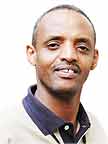Some positions taken by international media watchdogs never cease to amaze. They have taken it upon themselves to think they have the monopoly of reason.


Some positions taken by international media watchdogs never cease to amaze. They have taken it upon themselves to think they have the monopoly of reason.Gallup, one of the world’ most revered opinion polls, released a report on the state of world media freedom on the eve of this year’s World Press Freedom Day.The poll was carried out in 133 countries, and the question they posed to respondents was: "Do the media in this country have a lot of freedom, or not”?The answers were tabulated and calibrated basing on public opinion.Rwanda was the fourth country in Africa with a high score – after Senegal, Ghana and Niger – where its population gave a resounding 78% vote of confidence.It was 30th in the world, below Luxembourg, Portugal and Israel, but surprisingly, Freedom House, one of the media NGOs, thinks better. It haughtily tossed it in the "Not free” category.But Rwanda was not the only victim of bias; Paraguay (87%), Cambodia (90%), Thailand (77%) suffered the same fate, with no scientific proof or even respecting the will of the people.On the other hand, Lithuania and Latvia, who scored a paltry 46 and 56% respectively, were put in the elite club of "Free”, yet their people think otherwise.Rwandans know where they have come from. We, of all people, know what rogue media is capable of, and for the last 19 years, we have been trying to rebuild it from scratch and in most cases in partnership with the same international media stakeholders who are today crying foul! So it baffles when all those NGOs practice double standards.Or is it a deliberate ploy to perennially put countries like Rwanda in the "basket case” section in their numerous reports to attract more donor funding in order to remain pertinent?You will never find these organisations poking countries with powerful media empires (possibly their main source of funding) in the eye. To them Rupert Murdoch and his scandalous trail, and grip on his media empire is an altar boy.His empire survives on political patronage because in most so called western democracies, the media endorses favoured political candidates who, once in power, will also scratch the media owners’ backs to do as they wish. And you call that press freedom.In an interview with Gallup, Dr. Karin Karlekar, project director of Freedom House’s Freedom of the Press Index, was quoted as saying: "Citizen evaluations of press freedom provide valuable insight and often validation of expert assessments, as both attempt to characterise the situation on the ground.”But does that "valuable insight” not apply to Cambodia, Paraguay, Thailand or Rwanda, countries where over 75% of citizens gave them a clean bill of health?While one cannot overlook the importance of having someone keeping a watchful eye over media freedom, but they lose relevance when they seek to act God.The past few years have seen Rwanda’s media landscape take shape, even at a faster rate than countries with an established media culture. But no, Rwanda, for some unknown reason, will remain the dark horse. It’s a shame to see that even media experts from the region, who have access to credible information, keep recycling the same half-baked "expert opinion”.Rwanda is now one of the few countries that have put in place mechanisms to have the press regulate itself without interference from the state. Their representatives have put in place a Self Regulation body and the Media law has been undergoing several changes to conform to the wishes of practitioners.All these would not have happened without the government’s goodwill, it listened to our grievances and threw the ball in our court, if we fail, we will have ourselves to blame.The people have all along had a front seat on this transformation; and they are the only witnesses to take into consideration, and that is why their opinion matters more than some foreign pen pusher who must have something to fill the empty pages of his report.


